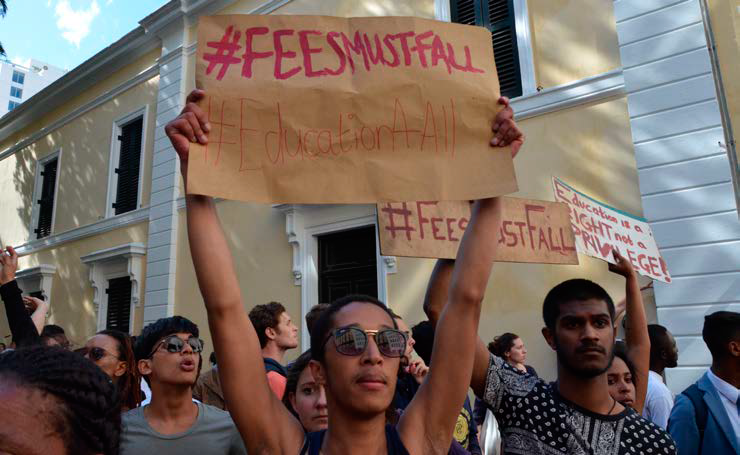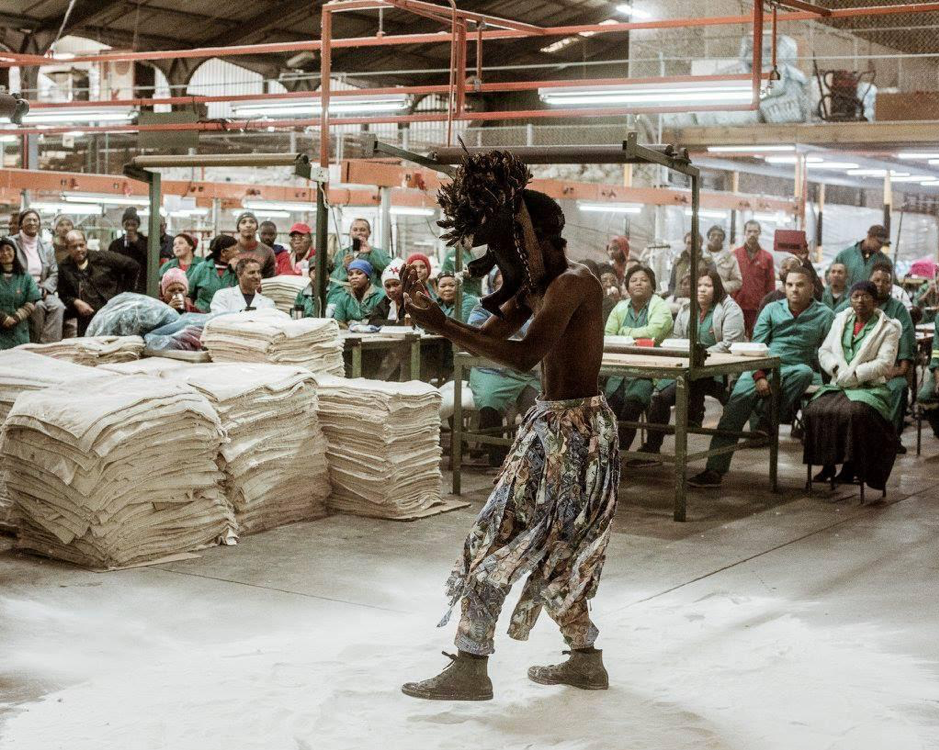An image from Zanele Muholi’s Phindile I, Paris, 2014 from the Somnyama Ngonyama series - part of Any Given Sunday in 2016 - around the Cape Town Railway Station. (Photo: Riason Naidoo)
On a Sunday in June 2016 commuters on a midday train from Cape Town to Simon’s Town suddenly found themselves listening to poems from Koleka Putuma’s Collective Amnesia. At a meat market in Khayelitsha, passersby became participants in artist/sangoma Buhlebezwe Siwani’s interactive performance Qunusa! Buhle. Workers in a textile factory watched Gerald Machona’s INFLUX III during their lunch break, a performance that incorporated sounds from a sewing machine. All over the coastal city, citizens from every class and creed witnessed and heard art works that encompassed performance, music, dance, painting and photography as part of curator Riason Naidoo’s public art project Any Given Sunday.
 Students hold up placards demanding free tertiary education for all, 2015, Cape Town. (Photo: Wandile Kasibe)
Students hold up placards demanding free tertiary education for all, 2015, Cape Town. (Photo: Wandile Kasibe)
The project was inspired by the RhodesMustFall and FeesMustFall student movements, which challenged the structures of privilege, class and wealth via access to higher education; some of the nine artists/collectives in Any Given Sunday also participated in the 2015 protests. The challenge for artists, curators and museums in South Africa is how to make art reach out beyond the minority already initiated in art. The public art project emerged out of questions such as these and was an attempt to work outside of the recognised structures of validation and institutions that control art production, approval and dissemination.
This guerrilla approach, of random and covert interventions, underscored the central intention of the series: a gentle and submerged way of foregrounding contested notions of visibility and acceptance in the city’s racially segregated spaces.
The culture of activism under apartheid has been carried forward into our democracy by a new generation of artists. The work of participating visual artists — Buhlebezwe Siwani, Zanele Muholi, Gabrielle Goliath, Gerald Machona, Sethembile Msezane, Burning Museum, Hasan and Husain Essop, poet Koleka Putuma and veteran musician Madosini — all centered, in various ways, on questions of power and prejudice, be they structural, institutional or personal, or a combination of these elements.
 A crowd gathers around Madosini playing impromptu in a square in Langa on Sunday 24 July 2016. (Photo: Johnny Miller)
A crowd gathers around Madosini playing impromptu in a square in Langa on Sunday 24 July 2016. (Photo: Johnny Miller)
This special 24-page feature is available on the Mail & Guardian website here: [pvfw-embed viewer_id=”508568″ width=”100%” height=”800″ zoom=”auto” pagemode=”none”]. It is also available in print format in the Western Cape this Friday, 21 January 2022 and at the Rupert Museum in Stellenbosch until Sunday 27 February 2022.
This feature looks back on, illuminates and analyses the art project that took place in the Mother City five years ago. This is not your conventional exhibition catalogue, and includes a series of insightful essays by Jay Pather, Richard Pithouse, Anthony Bogues, Thuli Gamedze, Uzma Rizvi and Naidoo himself — with exclusive interviews and profiles on each of the artists’ interventions — that makes Any Given Sunday a must-read for all those interested in art, culture and politics.
 Pak Ndjamena performs to workers during their lunch break at Romatex Home Textiles in Elsie’s River as part of the performance INFLUX III with Gerald Machona. (Photo: Riason Naidoo)
Pak Ndjamena performs to workers during their lunch break at Romatex Home Textiles in Elsie’s River as part of the performance INFLUX III with Gerald Machona. (Photo: Riason Naidoo)